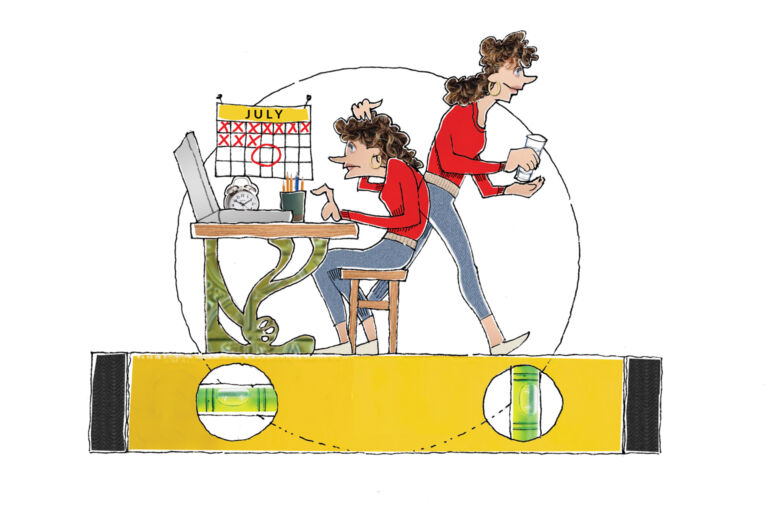At the end of every class, I give my students a “Two Minutes of Zen” talk — advice for navigating the ups and downs of law school. One of the talks my students seem to remember most is what I call the “Maybe Mindset,” which starts with the Taoist story of the Zen Farmer from John Suler’s “Zen Stories to Tell Your Neighbors: Maybe.”
An old farmer had worked his crops for many years, and he was one of the most successful farmers in the village. One day his horse ran away. Upon hearing the news, his neighbors came to visit. “Such bad luck,” they said sympathetically. “Maybe,” the farmer replied. The next morning the horse returned, bringing with it three other wild horses. “How wonderful,” the neighbors exclaimed. “Maybe,” replied the old farmer.
The following day, his son tried to ride one of the untamed horses. The son was thrown off and broke his leg. Upon hearing this, the neighbors came to offer their sympathy over his son’s misfortune. “Maybe,” answered the farmer. That very day, military officials came to the village to draft young men into the army. Seeing that the son’s leg was broken, they passed him by. The neighbors congratulated the farmer on how well things had turned out. “Maybe,” said the farmer.
The point of the story is pretty clear: in reality, everything is a “maybe” because we just don’t know where a particular event will lead. After I tell the Zen Farmer parable, I follow it up with one of my all-time favorite quotes from William Shakespeare: “Nothing is good or bad, but thinking makes it so.”
I usually share this Zen with my students after their first round of midterms — one of the most stressful times for law students.
Law school is ultra-competitive, which means sometimes hiring decisions can be made on the smallest margins. Even one poor grade on a midterm can wreck students’ chances of interviewing for the highest-paying jobs. Some students are a little reluctant to buy in to what Shakespeare and I are selling, but I always expound on this Zen with a personal story to drive the point home.
A few years after I graduated from law school, a very good friend of mine was studying for the bar exam. As I begin the story, I pause and ask my students if they would agree that getting very sick two weeks before taking the bar exam would be at least one situation we could definitively label as “bad” — and they all agree.
I proceed to tell them that my friend had been having intermittent headaches and flu-like symptoms throughout law school, but she insisted that she was not going to waste time going go to see a doctor just for some prescription meds. With the bar exam just two weeks away, she decided that she had no choice but to see a doctor to stay on her study schedule. At that visit, she was diagnosed with an aggressive brain tumor. The doctor told her that if she had not come in when she did, she would have likely died within a few months. Sometimes, obstacles are gifts in disguise.
Developing a “Maybe Mindset” is one of the keys to navigating the rigors of law school. In this way, we can train our brain that when we initially think something “bad” happens, we can re-frame this as a “maybe” (or eventually, maybe even a positive thing). If your car breaks down on the way to a job interview, maybe that job wasn’t the best one for you. Maybe a better job awaits. If you didn’t get the grade you wanted in a class, maybe that propels you to figure out a better way of studying. If a serious relationship ends abruptly, maybe you will create a better one down the road.
The Maybe Mindset teaches us to respond to a situation rather than react.
Reacting to a potentially negative event is often emotionally charged, which often makes things worse. Responding to a distressing situation is much more deliberate, utilizing emotional intelligence to guide your thoughts, emotions, and actions. When responding, you are pausing to give your thoughts some space to breathe in order to evaluate the best way to proceed. Choosing to respond trains your brain to deal with stressful situations in a calmer and more productive manner. This is the essence of the Maybe Mindset.
There are several acronyms that describe mindful methods to help you respond, rather than react, to stressful situations or events.
Two popular ones:
- The STOP method, which stands for Stop, Take a deep breath, Observe your thoughts, and Proceed (with awareness and intention).
- The RAIN method, which generally stands for: Recognize, Allow, Investigate, and Nurture.
These strategies have the same basic purpose — to remind you to pause before you react to a given situation. The point is to modulate your response so that you don’t act impulsively and make a difficult situation even worse.
These techniques are great, but the above acronyms have always thrown me off a bit.
Neuroscience tells us that the words you say to yourself create specific emotional responses within your brain and body — and I am not a big fan of the mental imagery or feeling I get when I think of “stop” or “rain.” As such, I use my own acronym, SOAR, to help remind me to respond rather than react to difficult situations:
S – Stop thinking
O – Observe how you are feeling
A – Acknowledge that what is happening is neither good nor bad
R – Respond with a Maybe Mindset, without judgment
When I think of the acronym SOAR, the feeling I get is one of flying over the stressful situation or event. It also reminds me that overcoming obstacles can send me soaring to new heights of growth, maturity, and confidence. Maybe what I perceive to be an obstacle right now will turn out to be a gift in the not-so-distant future. This, of course, is not always easy in law school, but the more you practice, the easier it will become. So, the next time something “bad” happens and you feel negative thoughts or emotions swelling within you, pause and call upon your maybe mindset to SOAR above the fray.
Chad Noreuil is a clinical professor of law at Arizona State University Sandra Day O’Connor College of Law. He has published two books on the bar exam, “The Zen of Passing the Bar Exam” and “The Arizona Bar Exam: Pass it Now,” and two books on law school success, “The Zen of Law School Success” and “Law 101: The Book and Documentary.” In addition, he has written three legal thrillers, “Imminent Danger,” “Cross,” and “Innocence Within.”







